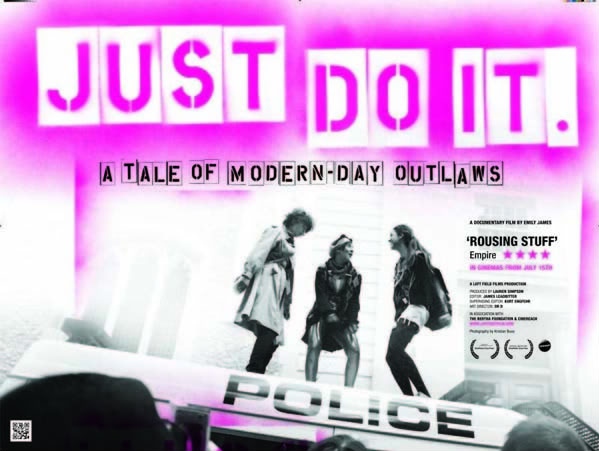
by Shaun Chamberlin | Jun 15, 2011 | All Posts, Climate Change, Cultural stories, Favourite posts, Philosophy, Transition Movement
Last night I went to the première screening of an excellent new film called Just Do It. It's a record of the direct action climate movement - Climate Camp, Plane Stupid et al. - made with the full cooperation of the activists, and it's worth checking out, especially if you've never been directly involved yourself.
It is a story of people responding to the threat to their future with courage, determination, humour and camaraderie. It's also a film that I remember existing only as a flyer, asking whether we would like to see a truly independent film developed outside mainstream production models and distributed for free. Hundreds of us donated, and I was keen to see the result.
After the screening, there was a Q&A session with the director, Emily James, but I found myself sitting there with a question in my head that was prompted by the film, but was refusing to form itself into anything concise and coherent. It was connected with that dreaded thought that everyone involved with any form of heartfelt climate action knows only too well - but what if it's all too late?
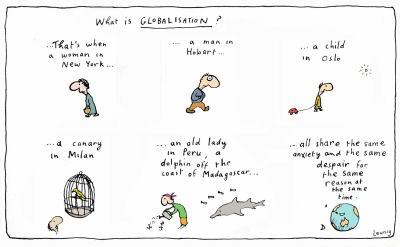 Let me explain. The footage in the film is from 2009 - the buildup to the Copenhagen climate conference in December of that year. It briefly reminds its audience of all the climate science that was marshalled back then to make clear that this was our last hope at curbing emissions to prevent the climate system hurtling off into unstoppable destabilisation. And then, of course, it reminds us of the abject failure this grand conference produced...
One of the most affecting moments in the film was the close-up on one inspiring activist's face as she is asked "but does all this actually achieve anything?" She searches her mind, begins to speak, hesitates, starts again, and stops. Then her eyes seem to look into her heart and soul, and maybe even to shy away from some of the things they see there, before, as I remember, she settles upon "well, it's better than doing nothing".
To me, it was a sad moment, and a question that seemed unresolved, even as the film ended by reminding us that the Heathrow runway expansion has been cancelled, that the Kingsnorth coal power plant plans have been scrapped, and that projects like the exciting Transition Heathrow are growing up where only tarmac and fumes would otherwise have been.
Let me explain. The footage in the film is from 2009 - the buildup to the Copenhagen climate conference in December of that year. It briefly reminds its audience of all the climate science that was marshalled back then to make clear that this was our last hope at curbing emissions to prevent the climate system hurtling off into unstoppable destabilisation. And then, of course, it reminds us of the abject failure this grand conference produced...
One of the most affecting moments in the film was the close-up on one inspiring activist's face as she is asked "but does all this actually achieve anything?" She searches her mind, begins to speak, hesitates, starts again, and stops. Then her eyes seem to look into her heart and soul, and maybe even to shy away from some of the things they see there, before, as I remember, she settles upon "well, it's better than doing nothing".
To me, it was a sad moment, and a question that seemed unresolved, even as the film ended by reminding us that the Heathrow runway expansion has been cancelled, that the Kingsnorth coal power plant plans have been scrapped, and that projects like the exciting Transition Heathrow are growing up where only tarmac and fumes would otherwise have been.
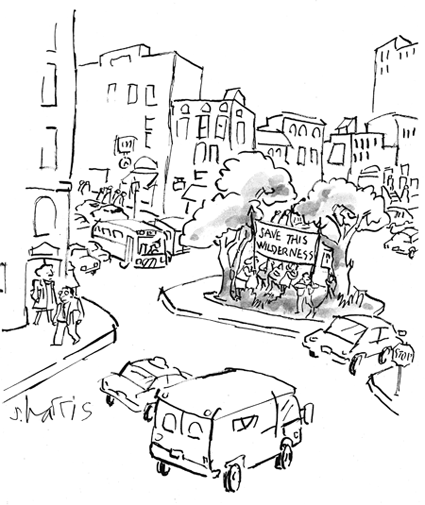 As the deserved applause rang to the credits, I tried to figure out how to formulate this sadness into a question. Eventually, as the Q&A session moved towards its end, I gave up on producing any pithy question, but resolved nonetheless to share the journey I had personally been taken on by watching the film.
And as I spoke, I realised that there is a better answer to that question – does all this actually achieve anything? – than the one spoken in the film. It is the one that is lived by the people portrayed in it.
As my mess of a question/journey/statement tumbled out, and this realisation took form, I found myself ending with a quote from Paul Wellstone, “If we don’t fight hard enough for the things we stand for, at some point we have to recognise that we don’t really stand for them.”
This seemed to ring true, with Emily James responding that she was glad that this question had been asked, and that that quote reflected her experience - that even if we were to lose our struggle for a future, we would want to have lived our present honestly as who we are. In my imagination, it seemed as though she were saying that we sometimes have to put our bodies on the line to save our souls.
As the deserved applause rang to the credits, I tried to figure out how to formulate this sadness into a question. Eventually, as the Q&A session moved towards its end, I gave up on producing any pithy question, but resolved nonetheless to share the journey I had personally been taken on by watching the film.
And as I spoke, I realised that there is a better answer to that question – does all this actually achieve anything? – than the one spoken in the film. It is the one that is lived by the people portrayed in it.
As my mess of a question/journey/statement tumbled out, and this realisation took form, I found myself ending with a quote from Paul Wellstone, “If we don’t fight hard enough for the things we stand for, at some point we have to recognise that we don’t really stand for them.”
This seemed to ring true, with Emily James responding that she was glad that this question had been asked, and that that quote reflected her experience - that even if we were to lose our struggle for a future, we would want to have lived our present honestly as who we are. In my imagination, it seemed as though she were saying that we sometimes have to put our bodies on the line to save our souls.
 The next question from the audience was a response to this, and a simple and interesting one - "so is activism therapy then?". The response from Emily was an enthusiastic "yes", and an explanation of how the process has helped many people to rediscover themselves and their joy in life, and of what an exceptionally supportive community there is among activists.
But I felt that this perhaps wasn't the most interesting thrust behind the question. To me the question hit home more as "so is activism only therapy then"? In other words, are you activists only pretending to be doing this to change the world, when really you're just trying to make yourselves feel better about the understanding that you can't?
And to this, as to all the best questions, the answer seems to be "er, yes and no. It's a bit more complicated than that"!
Because of course we act in order to change the world. And change it we do. Indeed, as a friend says, we cannot not change the world, whatever any of us choose to do. And as we change it, it changes us. And as it changes us, we change it. We are all activists.
And if the story we tell with these changes is one that we are proud to be telling, to the very core of our being, then activism is certainly therapeutic. But that kind of activism is not 'only therapeutic', it is spiritual. It is simply an expression of what we believe life to be for.
The next question from the audience was a response to this, and a simple and interesting one - "so is activism therapy then?". The response from Emily was an enthusiastic "yes", and an explanation of how the process has helped many people to rediscover themselves and their joy in life, and of what an exceptionally supportive community there is among activists.
But I felt that this perhaps wasn't the most interesting thrust behind the question. To me the question hit home more as "so is activism only therapy then"? In other words, are you activists only pretending to be doing this to change the world, when really you're just trying to make yourselves feel better about the understanding that you can't?
And to this, as to all the best questions, the answer seems to be "er, yes and no. It's a bit more complicated than that"!
Because of course we act in order to change the world. And change it we do. Indeed, as a friend says, we cannot not change the world, whatever any of us choose to do. And as we change it, it changes us. And as it changes us, we change it. We are all activists.
And if the story we tell with these changes is one that we are proud to be telling, to the very core of our being, then activism is certainly therapeutic. But that kind of activism is not 'only therapeutic', it is spiritual. It is simply an expression of what we believe life to be for.
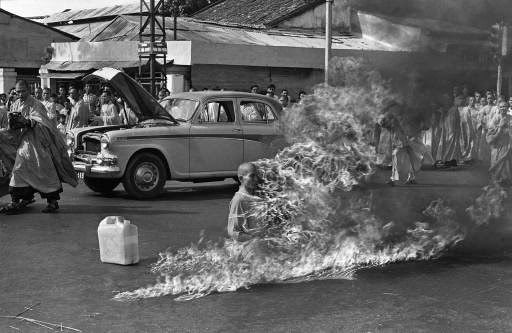 So the thought-provoking activist in the film was right - acting in some way to reflect our beliefs in our actions is indeed better than quietly dying inside, no matter what the external consequences. Perhaps Wendell Berry said it best,
So the thought-provoking activist in the film was right - acting in some way to reflect our beliefs in our actions is indeed better than quietly dying inside, no matter what the external consequences. Perhaps Wendell Berry said it best,
“Protest that endures, I think, is moved by a hope far more modest than that of public success, namely, the hope of preserving qualities in one's own heart and spirit that would be destroyed by acquiescence.”
But this is different from those times when activism is based on a lie - when acting is simply easier than admitting that you don't really believe that these actions can create the change you want to see. This kind of activism probably deserves to be challenged as 'only therapy', and a dangerous, deceitful kind of therapy at that.
...And of course there's only one reason why that audience question struck a painful chord for me, and prompted this rare blog post. It's because I've indulged in a bit of that in my time - ignoring the quiet inner voice that whispers the truth, telling me that the course I have chosen is futile, or counter-productive, or simply no longer a reflection of my highest truth. As Vanessa Spedding has it,
“It would be interesting if all campaigners did this: stopped, went home, and considered what we are really doing with our time and our ideas. Striving to be true to ourselves would seem to be a sensible first goal.”
This is exactly what I am trying to do at present, hence the lack of speaking, writing etc of late. I am very much in a listening phase, rather than a speaking one, and that feels very right. After last night's interesting excursion, I have just ordered a copy of the provocative Deep Green Resistance, and will also be keeping an eye on the blog of one lady who is trying to find something more effective altogether than resistance. I will let you know how we get on.
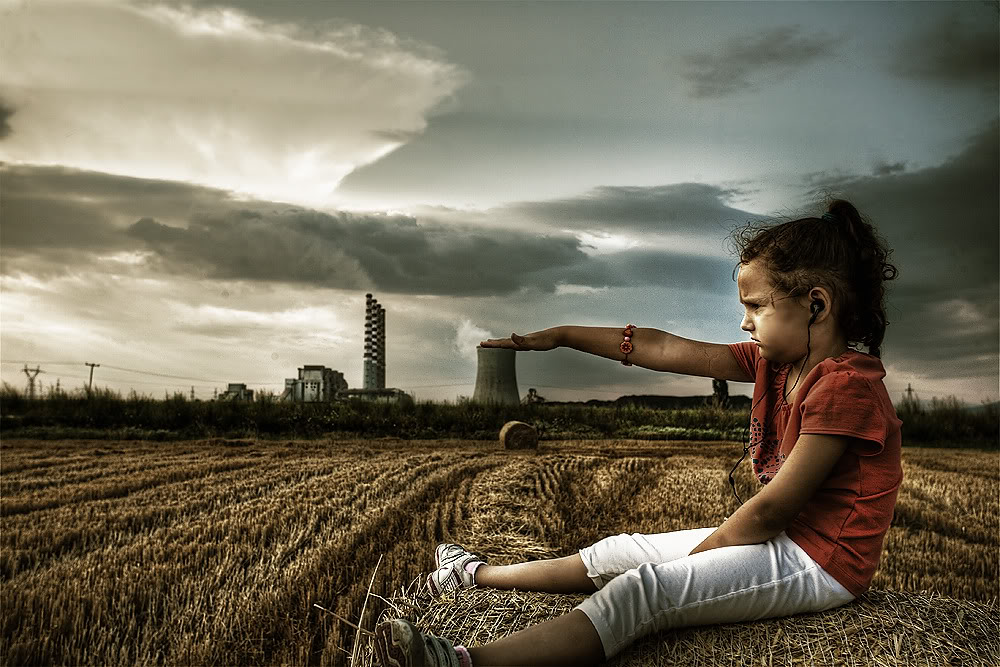

by Shaun Chamberlin | Jun 9, 2010 | All Posts, Climate Change, Cultural stories, Favourite posts, Peak Oil, TEQs (Tradable Energy Quotas), The Transition Timeline, Transition Movement
http://www.darkoptimism.org/wp-content/uploads/2020/10/10-03-26-Radio-EcoShock_Chamberlin_LoFi.mp3 Christopher Fraser of London Transition has kindly transcribed the above popular interview with Canada’s Radio Ecoshock that I posted a couple of months back....

by Shaun Chamberlin | Mar 28, 2010 | All Posts, Climate Change, Cultural stories, Peak Oil, TEQs (Tradable Energy Quotas), The Transition Timeline, Transition Movement
http://www.darkoptimism.org/wp-content/uploads/2020/10/10-03-26-Radio-EcoShock_Chamberlin_LoFi.mp3 Above is a 24 minute interview I did last week with Canada’s excellent Radio Ecoshock. The full 60 minute show can be heard here. Dark Optimism readers may also be...
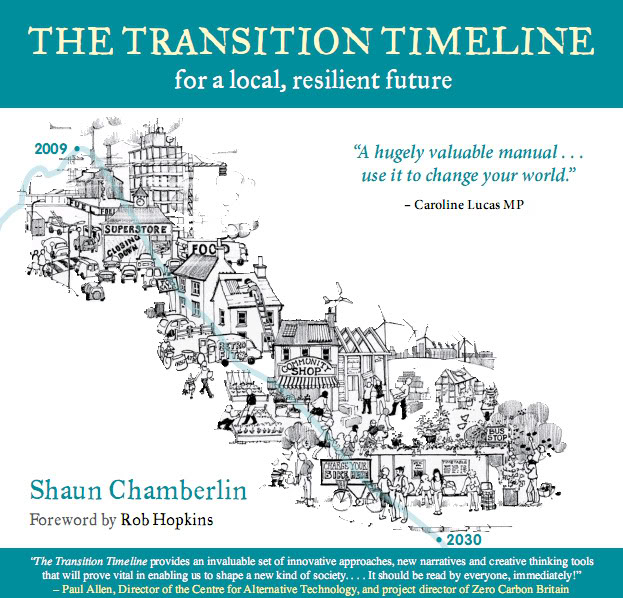
by Shaun Chamberlin | Apr 15, 2009 | All Posts, Favourite posts, Reviews and recommendations, The Transition Timeline, Transition Movement
The last month has been a bit of a blur, with very well-attended book launch events all over Britain, a two-day seminar at the Centre for Alternative Technology scoping out Zero Carbon Britain 2, more radio interviews, and even being caught on film for the first time (more practice required methinks!).
While I've been zipping around, a number of people have requested a more detailed write-up on The Transition Timeline than I have so far provided online, so let's take a closer look.
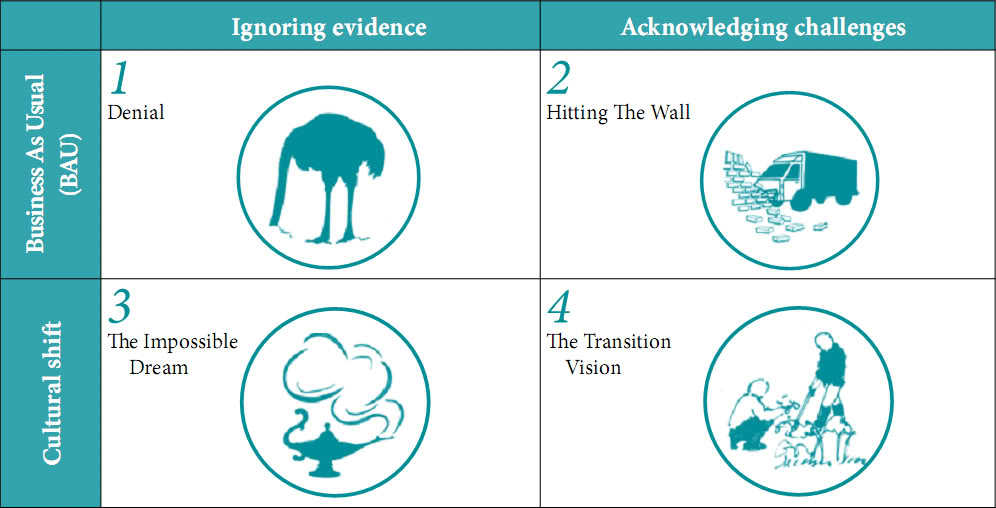 In overview, then, the first half of the book explores four different visions of how the next twenty years could pan out for the UK and world, before focusing on what might be considered the most desirable of these, the Transition Vision, and examining the practical details of this in depth. There is also a chapter here provided by Rob Hopkins, the originator of the Transition movement, in which he outlines the progress Transition initiatives have made to date, and provides a set of tools for communities working towards their local Energy Descent Action Plans (a key aspect of the Transition process).
The second half of the book provides a thoroughly researched yet readable exploration of the latest evidence and thinking on climate change and peak oil, and the interactions between the two, including a section focused on their present and future impacts in the UK, and on our Government's responses to date.
In overview, then, the first half of the book explores four different visions of how the next twenty years could pan out for the UK and world, before focusing on what might be considered the most desirable of these, the Transition Vision, and examining the practical details of this in depth. There is also a chapter here provided by Rob Hopkins, the originator of the Transition movement, in which he outlines the progress Transition initiatives have made to date, and provides a set of tools for communities working towards their local Energy Descent Action Plans (a key aspect of the Transition process).
The second half of the book provides a thoroughly researched yet readable exploration of the latest evidence and thinking on climate change and peak oil, and the interactions between the two, including a section focused on their present and future impacts in the UK, and on our Government's responses to date.
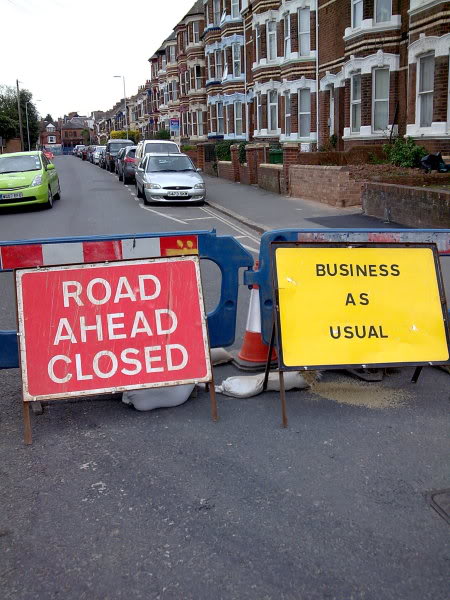 The book itself initially grew out of three motivations. Firstly, it was requested by existing Transition initiatives, who were trying to produce realistic positive visions of the future for their communities, but needed some input on the major trends facing the UK in our near-future – the kinds of things which are going to affect them but which may be hard for individual communities to directly affect (e.g. peak oil, government policy or UK food supply). Accordingly, the book provides a readable summary of the existing research in key areas of concern (e.g. population, food and water, energy, healthcare...), outlining the present position and trends before exploring possible futures.
The second impetus for the book was my personal concern about whether the Transition process is adequate to dealing with the sheer scale of the challenges we collectively face. This is a theme that runs throughout the book, as the process of writing was intimately bound up with my own exploration of this.
The final energy behind the book's creation was the desire to flesh out the Transition Vision. This concept was touched on in Rob's Transition Handbook, but Rob and I felt strongly that it needed to be developed further. Core to Transition is the idea that we need a positive realistic vision of the future to get us all out of bed in the morning, and I was very keen to make this feel more tangible and real by exploring the possibilities and challenges in more detail.
The book itself initially grew out of three motivations. Firstly, it was requested by existing Transition initiatives, who were trying to produce realistic positive visions of the future for their communities, but needed some input on the major trends facing the UK in our near-future – the kinds of things which are going to affect them but which may be hard for individual communities to directly affect (e.g. peak oil, government policy or UK food supply). Accordingly, the book provides a readable summary of the existing research in key areas of concern (e.g. population, food and water, energy, healthcare...), outlining the present position and trends before exploring possible futures.
The second impetus for the book was my personal concern about whether the Transition process is adequate to dealing with the sheer scale of the challenges we collectively face. This is a theme that runs throughout the book, as the process of writing was intimately bound up with my own exploration of this.
The final energy behind the book's creation was the desire to flesh out the Transition Vision. This concept was touched on in Rob's Transition Handbook, but Rob and I felt strongly that it needed to be developed further. Core to Transition is the idea that we need a positive realistic vision of the future to get us all out of bed in the morning, and I was very keen to make this feel more tangible and real by exploring the possibilities and challenges in more detail.
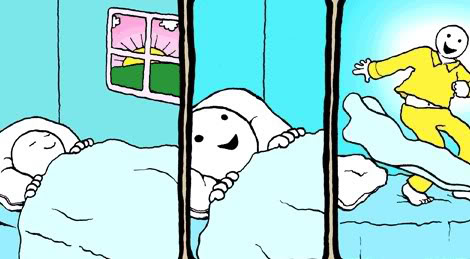 This importance of this was reinforced for me mid-way through the drafting process when the Age of Stupid team brought a sneak preview of their film to the Transition Conference last year. The response was generally that it was a brilliant film, but that it was still focused on the "Denial" scenario and the awful places that could lead, without showing the audience the positive alternative.
Franny Armstrong, the film's director, agreed, and challenged us to flesh out that alternative vision to set alongside her film, so that people could clearly perceive the real choices we face. Those discussions stayed with me throughout the drafting process, and ultimately led to the tie-in between the launch of the film and the book, and Franny's comment that: "There is obviously no single, magic bullet solution to climate change. But if I was forced to choose one – our best hope of averting the crisis – it would definitely be Transition Towns."
This importance of this was reinforced for me mid-way through the drafting process when the Age of Stupid team brought a sneak preview of their film to the Transition Conference last year. The response was generally that it was a brilliant film, but that it was still focused on the "Denial" scenario and the awful places that could lead, without showing the audience the positive alternative.
Franny Armstrong, the film's director, agreed, and challenged us to flesh out that alternative vision to set alongside her film, so that people could clearly perceive the real choices we face. Those discussions stayed with me throughout the drafting process, and ultimately led to the tie-in between the launch of the film and the book, and Franny's comment that: "There is obviously no single, magic bullet solution to climate change. But if I was forced to choose one – our best hope of averting the crisis – it would definitely be Transition Towns."
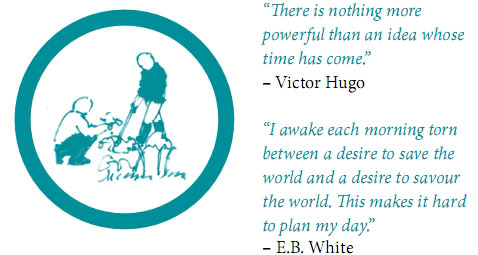 The Transition Vision we developed, then, is of a future in which we create a resilient, more localised society which avoids the worst potential of climate change and peak oil through building thriving lower-energy communities teeming with satisfying lifestyles and fulfilled people.
In the book I track this vision through a 'history of the next twenty years', examining population, demographics, food, water, energy, transport and healthcare, and then drawing together the common threads which appear to run through our near-future in all of these areas.
I should emphasise at this point that as the author I make no claim to any 'ownership' of this vision or timeline. It was developed in collaboration with as many Transitioners as I could manage to speak to, and represents and supports the learning and practical progress of the Transition movement as it continues to spread and mature. Now that I have pulled together a first draft, the never-ending process of developing the vision of the future we want to co-create for our communities and world is intended to continue as a collaborative project. This has already begun over at the Transition Forums, and in the near-future we plan to put the content of my book up on Appropedia, so that as many people as possible can collaborate in developing the second edition, just as has already been done with The Transition Handbook. We need as many heads, hearts and hands as possible working on our best responses to this unprecedented historical situation.
For me personally, one thing that has come out of the many long train journeys that I have taken this month has been a chance to actually read my own book! That may sound strange, but I found it is a very different experience to approach the book as a general reader than as a writer, proofreader etc. From this new perspective it seemed to me that the graph reproduced below represents perhaps the core shift in cultural perspective underlying the Transition Vision - that there is not a simple direct relationship between consumption and fulfilment.
The Transition Vision we developed, then, is of a future in which we create a resilient, more localised society which avoids the worst potential of climate change and peak oil through building thriving lower-energy communities teeming with satisfying lifestyles and fulfilled people.
In the book I track this vision through a 'history of the next twenty years', examining population, demographics, food, water, energy, transport and healthcare, and then drawing together the common threads which appear to run through our near-future in all of these areas.
I should emphasise at this point that as the author I make no claim to any 'ownership' of this vision or timeline. It was developed in collaboration with as many Transitioners as I could manage to speak to, and represents and supports the learning and practical progress of the Transition movement as it continues to spread and mature. Now that I have pulled together a first draft, the never-ending process of developing the vision of the future we want to co-create for our communities and world is intended to continue as a collaborative project. This has already begun over at the Transition Forums, and in the near-future we plan to put the content of my book up on Appropedia, so that as many people as possible can collaborate in developing the second edition, just as has already been done with The Transition Handbook. We need as many heads, hearts and hands as possible working on our best responses to this unprecedented historical situation.
For me personally, one thing that has come out of the many long train journeys that I have taken this month has been a chance to actually read my own book! That may sound strange, but I found it is a very different experience to approach the book as a general reader than as a writer, proofreader etc. From this new perspective it seemed to me that the graph reproduced below represents perhaps the core shift in cultural perspective underlying the Transition Vision - that there is not a simple direct relationship between consumption and fulfilment.
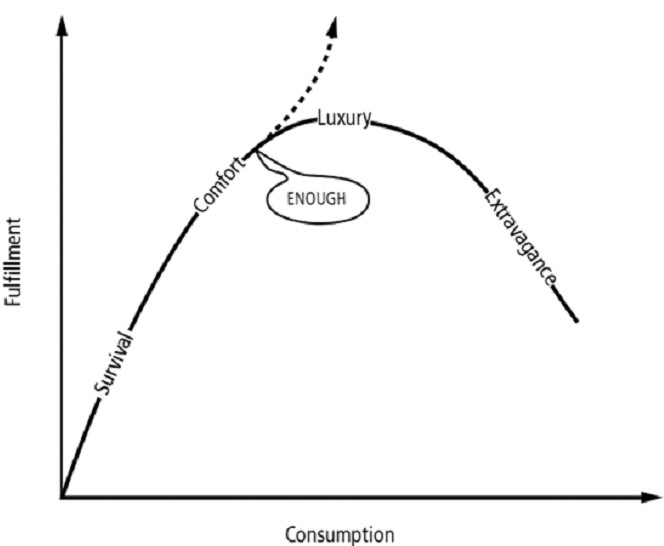 Reading through, and relying on my earlier research legwork, I found it was easy enough to trace our society's progression along this curve in each of the areas examined in the book, but what really struck me was the shift in the underlying message of this graph. I originally found the image in the 2002 essay The Great Transition, which in turn credits the 1992 book Your Money or Your Life, and the concepts behind it clearly hold a far longer heritage than that, yet there is a distinctly modern twist. While this graph used to make perhaps a fairly abstract point about the nature of fulfilment and well-being, in our modern world we can recognise that continuing on down the path of ever-greater consumption of energy and material resources now not only leads to lower levels of heartfelt satisfaction, but also to environmental devastation, massive mortality rates and widespread outright misery.
Working on The Transition Timeline has made it ever clearer to me that our choice now is between taking perhaps our last chance to enjoy a far happier, more satisfying world, or experiencing a vastly less desirable one - more of the same simply isn't an option. Here I am put in mind of Paul Wellstone's words, "If we don't fight hard enough for the things we stand for, at some point we have to recognise that we don't really stand for them".
This book was written for those communities who have already taken the brave decision to work for the future we all hope to live in, and I very much hope that it fills its intended role as a key tool supporting them - I feel privileged to have been entrusted with it.
--
Edit - for the range of online reviews and the opportunity to support my work by ordering a signed copy see here.
Reading through, and relying on my earlier research legwork, I found it was easy enough to trace our society's progression along this curve in each of the areas examined in the book, but what really struck me was the shift in the underlying message of this graph. I originally found the image in the 2002 essay The Great Transition, which in turn credits the 1992 book Your Money or Your Life, and the concepts behind it clearly hold a far longer heritage than that, yet there is a distinctly modern twist. While this graph used to make perhaps a fairly abstract point about the nature of fulfilment and well-being, in our modern world we can recognise that continuing on down the path of ever-greater consumption of energy and material resources now not only leads to lower levels of heartfelt satisfaction, but also to environmental devastation, massive mortality rates and widespread outright misery.
Working on The Transition Timeline has made it ever clearer to me that our choice now is between taking perhaps our last chance to enjoy a far happier, more satisfying world, or experiencing a vastly less desirable one - more of the same simply isn't an option. Here I am put in mind of Paul Wellstone's words, "If we don't fight hard enough for the things we stand for, at some point we have to recognise that we don't really stand for them".
This book was written for those communities who have already taken the brave decision to work for the future we all hope to live in, and I very much hope that it fills its intended role as a key tool supporting them - I feel privileged to have been entrusted with it.
--
Edit - for the range of online reviews and the opportunity to support my work by ordering a signed copy see here.
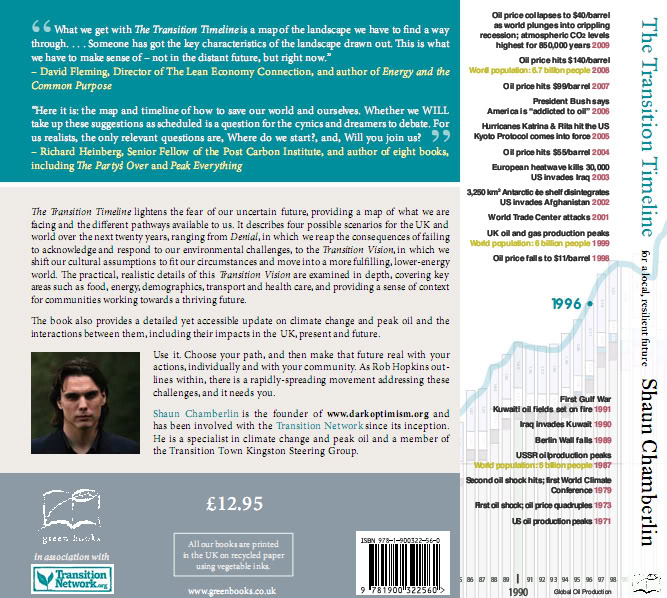 “Peak oil and climate change are two of the greatest challenges we face today; the Transition Town movement is firmly rooted in the idea that people taking action now in their communities can not only tackle these environmental threats but also, in the process of doing so, lead more fulfilling lives. It is about hope in an otherwise bleak seeming future. Above all, it's about the power of an alternative vision for how society could be and not waiting for government or politicians to get it right.
The Transition Timeline is designed to bring that vision to life – with stories of what communities have already achieved, with updates on the latest scientific data, and with ‘maps’ that highlight key landmarks on the journey towards a zero carbon future. It's a hugely valuable manual for anyone committed to turning dreams into reality. Don't just read this book – use it to change your world.”
~ Caroline Lucas MP, leader of the Green Party of England and Wales, and co-author of Green Alternatives to Globalisation: A Manifesto.
--
“Shaun Chamberlin ties down the uncertainties about climate, energy, food, water and population, the big scene-setters of our future, with no-nonsense authority. What we get with The Transition Timeline is a map of the landscape we have to find a way through. Map-making is a risky business: sooner or later someone is going to use your map and come across a treacherous swamp that isn’t marked. So you need to be alert to revisions and reports from travellers. But what matters is that someone has got the key characteristics of the landscape drawn out. This is what we have to make sense of – not in the distant future, but right now.
Don't set out without The Transition Timeline. Take a biro. Scribble updates, comments, expressions of shock and horror, notes to cheer yourself up. By the time your copy has been rained on, stained with blackberry juice, consulted, annotated, used to press and preserve a leaf of our autumnal world, you will have a good idea of where you are, and inspiration about where you are going. It is almost as good as getting there.”
~ Dr. David Fleming, director of The Lean Economy Connection, and author of Energy and the Common Purpose
--
“There is obviously no single, magic bullet solution to climate change. But if I was forced to choose one – our best hope of averting the crisis – it would definitely be Transition Towns.”
~ Franny Armstrong, Director of The Age of Stupid film
--
“Transition has emerged as perhaps the only real model we have for addressing our current crisis – a new, if vital, format for reconsidering our future. The Transition Timeline strengthens a fragile form, something that might, without a trace of irony, be called one of the last, best hopes for all of us.”
~ Sharon Astyk, author of Depletion and Abundance: Life on the New Home Front and A Nation of Farmers: Defeating the Food Crisis on American Soil
--
“Will the future be as rosy as The Transition Timeline suggests it might be? Will the people of Britain and the rest of the world begin immediately to make better decisions, taking the welfare of future generations into account? The answer to both questions is probably no.
Will serious repercussions of decisions already taken (regarding fossil fuel consumption and the structuring of our economy to depend on perpetual growth for its viability) come to bite us hard before we even have a chance to implement some of the excellent recommendations contained in this book? The answer to that one is certainly yes - we are already seeing dire consequences of past economic and energy decisions.
Nevertheless, without a vision of what can be, there is no alternative to a future completely constrained by the past. The ideal future set forth herein is not a useless pipe-dream. There is not a single outcome described in this book that could not realistically be achieved IF we all do things beginning now that are entirely within our ability to do.
So here it is: the map and timeline of how to save our world and ourselves. Whether we WILL take up these suggestions as scheduled is a question for the cynics and dreamers to debate. For us realists, the only relevant questions are, Where do we start?, and, Will you join us? ”
~ Richard Heinberg, Senior fellow of the Post Carbon Institute, and author of eight books, including The Party’s Over and Peak Everything
--
“The next 100 months will be a very special time for humanity. On numerous fronts, the consequences of the past 150 years of industrialisation are all simultaneously coming home to roost. Even senior experts, scientists, NGOs and political leaders fail to appreciate that the most recent evidence reveals a situation more urgent than had been expected, even by those who have been following it closely for decades. The Transition Timeline provides an invaluable set of innovative approaches, new narratives and creative thinking tools that will prove vital in enabling us to shape a new kind of society and a new kind of economy; stable in the long term, locally resilient, but still active in a global context, rich in quality jobs, a strong sense of purpose and reliant on indigenous, in-exhaustible energy. It should be read by everyone, immediately!”
~ Paul Allen, director of the Centre for Alternative Technology, and project director of Zero Carbon Britain
“Peak oil and climate change are two of the greatest challenges we face today; the Transition Town movement is firmly rooted in the idea that people taking action now in their communities can not only tackle these environmental threats but also, in the process of doing so, lead more fulfilling lives. It is about hope in an otherwise bleak seeming future. Above all, it's about the power of an alternative vision for how society could be and not waiting for government or politicians to get it right.
The Transition Timeline is designed to bring that vision to life – with stories of what communities have already achieved, with updates on the latest scientific data, and with ‘maps’ that highlight key landmarks on the journey towards a zero carbon future. It's a hugely valuable manual for anyone committed to turning dreams into reality. Don't just read this book – use it to change your world.”
~ Caroline Lucas MP, leader of the Green Party of England and Wales, and co-author of Green Alternatives to Globalisation: A Manifesto.
--
“Shaun Chamberlin ties down the uncertainties about climate, energy, food, water and population, the big scene-setters of our future, with no-nonsense authority. What we get with The Transition Timeline is a map of the landscape we have to find a way through. Map-making is a risky business: sooner or later someone is going to use your map and come across a treacherous swamp that isn’t marked. So you need to be alert to revisions and reports from travellers. But what matters is that someone has got the key characteristics of the landscape drawn out. This is what we have to make sense of – not in the distant future, but right now.
Don't set out without The Transition Timeline. Take a biro. Scribble updates, comments, expressions of shock and horror, notes to cheer yourself up. By the time your copy has been rained on, stained with blackberry juice, consulted, annotated, used to press and preserve a leaf of our autumnal world, you will have a good idea of where you are, and inspiration about where you are going. It is almost as good as getting there.”
~ Dr. David Fleming, director of The Lean Economy Connection, and author of Energy and the Common Purpose
--
“There is obviously no single, magic bullet solution to climate change. But if I was forced to choose one – our best hope of averting the crisis – it would definitely be Transition Towns.”
~ Franny Armstrong, Director of The Age of Stupid film
--
“Transition has emerged as perhaps the only real model we have for addressing our current crisis – a new, if vital, format for reconsidering our future. The Transition Timeline strengthens a fragile form, something that might, without a trace of irony, be called one of the last, best hopes for all of us.”
~ Sharon Astyk, author of Depletion and Abundance: Life on the New Home Front and A Nation of Farmers: Defeating the Food Crisis on American Soil
--
“Will the future be as rosy as The Transition Timeline suggests it might be? Will the people of Britain and the rest of the world begin immediately to make better decisions, taking the welfare of future generations into account? The answer to both questions is probably no.
Will serious repercussions of decisions already taken (regarding fossil fuel consumption and the structuring of our economy to depend on perpetual growth for its viability) come to bite us hard before we even have a chance to implement some of the excellent recommendations contained in this book? The answer to that one is certainly yes - we are already seeing dire consequences of past economic and energy decisions.
Nevertheless, without a vision of what can be, there is no alternative to a future completely constrained by the past. The ideal future set forth herein is not a useless pipe-dream. There is not a single outcome described in this book that could not realistically be achieved IF we all do things beginning now that are entirely within our ability to do.
So here it is: the map and timeline of how to save our world and ourselves. Whether we WILL take up these suggestions as scheduled is a question for the cynics and dreamers to debate. For us realists, the only relevant questions are, Where do we start?, and, Will you join us? ”
~ Richard Heinberg, Senior fellow of the Post Carbon Institute, and author of eight books, including The Party’s Over and Peak Everything
--
“The next 100 months will be a very special time for humanity. On numerous fronts, the consequences of the past 150 years of industrialisation are all simultaneously coming home to roost. Even senior experts, scientists, NGOs and political leaders fail to appreciate that the most recent evidence reveals a situation more urgent than had been expected, even by those who have been following it closely for decades. The Transition Timeline provides an invaluable set of innovative approaches, new narratives and creative thinking tools that will prove vital in enabling us to shape a new kind of society and a new kind of economy; stable in the long term, locally resilient, but still active in a global context, rich in quality jobs, a strong sense of purpose and reliant on indigenous, in-exhaustible energy. It should be read by everyone, immediately!”
~ Paul Allen, director of the Centre for Alternative Technology, and project director of Zero Carbon Britain
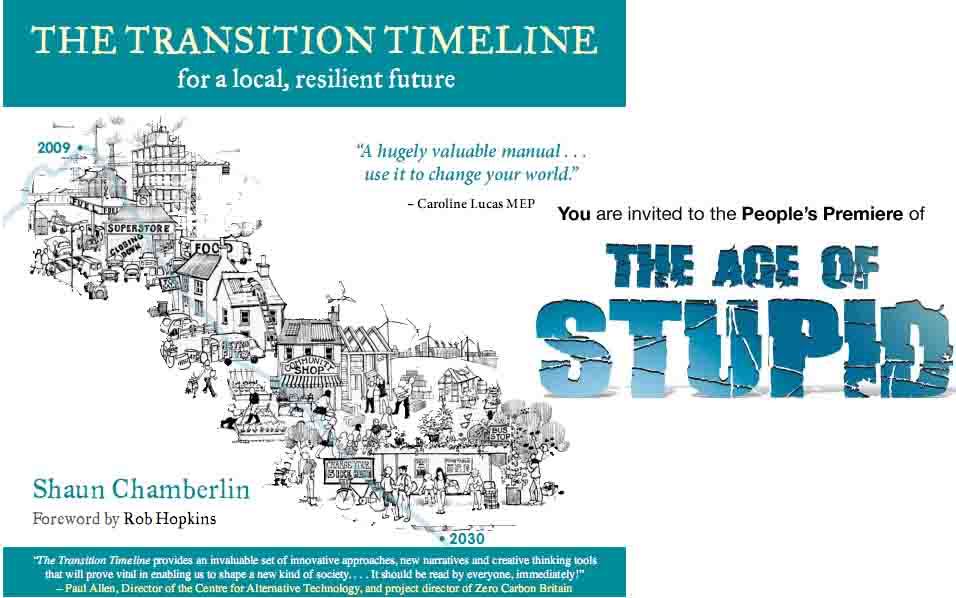
by Shaun Chamberlin | Mar 7, 2009 | All Posts, Cultural stories, The Transition Timeline, Transition Movement
Transition Town Kingston are hosting a pre-launch celebration of my new book, The Transition Timeline, at the Kingston Odeon on the 15th March (this Sunday) from 5:30pm.
This event will also form part of the nationwide People's Premiere of new film The Age of Stupid, directed by the inspirational Franny Armstrong, produced by Oscar-winning John Battsek, and starring Oscar-nominated Pete Postlethwaite. Tickets for the event are £10 and can be ordered here. For this you will be amongst the first to see The Age of Stupid, enjoy a live satellite link-up to the simultaneous premiere taking place in a solar tent in Leicester Square(!), witness the launch of the international "Not Stupid" campaign, and have the opportunity to discuss the film with both me and Hilary Gander, one of the founding members of the Campaign against Climate Change. I will also be selling and signing copies of The Transition Timeline at the Kingston screening, which will be the first opportunity for anyone to get their hands on a copy!
Over 100 tickets, of a capacity of 337, have been sold even before the main announcements, so make sure you book soon if you want to come support me and The Age of Stupid. Also bear in mind that the faster tickets sell for the premiere and opening weekend of the film, the more cinemas will show it as it is rolled out nationwide, so you can play your part in the success of this important and brilliant film, which I believe has the potential to radically shift popular conceptions of climate change. Al Gore's An Inconvenient Truth had a major impact, and this is a much better film. You won't regret seeing it.
After the events at the Odeon we have an area reserved at the Acorn 20 bar just across the road, from 8:15pm. Food can be purchased there, and those who cannot make the Odeon screening are welcome to join the celebrations there or pick up a copy of the book - 20 Richmond Rd, Kingston, KT2 5EB.
I know that a number of people who were keen to come will be unable to attend these events in Kingston as they are attending The Age of Stupid People's Premiere in another of the 65 participating cinemas around the country, so they will be welcome at my official book launch at The Totnes Bookshop in Totnes High Street, Devon from 7pm on Wednesday 1st April.
For those who can't make either event The Transition Timeline is now available to order here, or can be secured at the special price of £10 from me in person.
I will post again soon with more details of the book itself, but for now I will leave you with the design for the back and front covers respectively, and some of the endorsements already received.
--

 “Peak oil and climate change are two of the greatest challenges we face today; the Transition Town movement is firmly rooted in the idea that people taking action now in their communities can not only tackle these environmental threats but also, in the process of doing so, lead more fulfilling lives. It is about hope in an otherwise bleak seeming future. Above all, it's about the power of an alternative vision for how society could be and not waiting for government or politicians to get it right.
The Transition Timeline is designed to bring that vision to life – with stories of what communities have already achieved, with updates on the latest scientific data, and with ‘maps’ that highlight key landmarks on the journey towards a zero carbon future. It's a hugely valuable manual for anyone committed to turning dreams into reality. Don't just read this book – use it to change your world.”
~ Caroline Lucas MEP, leader of the Green Party of England and Wales, and co-author of Green Alternatives to Globalisation: A Manifesto.
--
“Shaun Chamberlin ties down the uncertainties about climate, energy, food, water and population, the big scene-setters of our future, with no-nonsense authority. What we get with The Transition Timeline is a map of the landscape we have to find a way through. Map-making is a risky business: sooner or later someone is going to use your map and come across a treacherous swamp that isn’t marked. So you need to be alert to revisions and reports from travellers. But what matters is that someone has got the key characteristics of the landscape drawn out. This is what we have to make sense of – not in the distant future, but right now.
Don't set out without The Transition Timeline. Take a biro. Scribble updates, comments, expressions of shock and horror, notes to cheer yourself up. By the time your copy has been rained on, stained with blackberry juice, consulted, annotated, used to press and preserve a leaf of our autumnal world, you will have a good idea of where you are, and inspiration about where you are going. It is almost as good as getting there.”
~ Dr. David Fleming, director of The Lean Economy Connection, and author of Energy and the Common Purpose
--
“There is obviously no single, magic bullet solution to climate change. But if I was forced to choose one – our best hope of averting the crisis – it would definitely be Transition Towns.”
~ Franny Armstrong, Director of The Age of Stupid film
--
“Transition has emerged as perhaps the only real model we have for addressing our current crisis – a new, if vital, format for reconsidering our future. The Transition Timeline strengthens a fragile form, something that might, without a trace of irony, be called one of the last, best hopes for all of us.”
~ Sharon Astyk, author of Depletion and Abundance: Life on the New Home Front and A Nation of Farmers: Defeating the Food Crisis on American Soil
--
“Will the future be as rosy as The Transition Timeline suggests it might be? Will the people of Britain and the rest of the world begin immediately to make better decisions, taking the welfare of future generations into account? The answer to both questions is probably no.
Will serious repercussions of decisions already taken (regarding fossil fuel consumption and the structuring of our economy to depend on perpetual growth for its viability) come to bite us hard before we even have a chance to implement some of the excellent recommendations contained in this book? The answer to that one is certainly yes - we are already seeing dire consequences of past economic and energy decisions.
Nevertheless, without a vision of what can be, there is no alternative to a future completely constrained by the past. The ideal future set forth herein is not a useless pipe-dream. There is not a single outcome described in this book that could not realistically be achieved IF we all do things beginning now that are entirely within our ability to do.
So here it is: the map and timeline of how to save our world and ourselves. Whether we WILL take up these suggestions as scheduled is a question for the cynics and dreamers to debate. For us realists, the only relevant questions are, Where do we start?, and, Will you join us? ”
~ Richard Heinberg, Senior fellow of the Post Carbon Institute, and author of eight books, including The Party’s Over and Peak Everything
--
“The next 100 months will be a very special time for humanity. On numerous fronts, the consequences of the past 150 years of industrialisation are all simultaneously coming home to roost. Even senior experts, scientists, NGOs and political leaders fail to appreciate that the most recent evidence reveals a situation more urgent than had been expected, even by those who have been following it closely for decades. The Transition Timeline provides an invaluable set of innovative approaches, new narratives and creative thinking tools that will prove vital in enabling us to shape a new kind of society and a new kind of economy; stable in the long term, locally resilient, but still active in a global context, rich in quality jobs, a strong sense of purpose and reliant on indigenous, in-exhaustible energy. It should be read by everyone, immediately!”
~ Paul Allen, director of the Centre for Alternative Technology, and project director of Zero Carbon Britain
“Peak oil and climate change are two of the greatest challenges we face today; the Transition Town movement is firmly rooted in the idea that people taking action now in their communities can not only tackle these environmental threats but also, in the process of doing so, lead more fulfilling lives. It is about hope in an otherwise bleak seeming future. Above all, it's about the power of an alternative vision for how society could be and not waiting for government or politicians to get it right.
The Transition Timeline is designed to bring that vision to life – with stories of what communities have already achieved, with updates on the latest scientific data, and with ‘maps’ that highlight key landmarks on the journey towards a zero carbon future. It's a hugely valuable manual for anyone committed to turning dreams into reality. Don't just read this book – use it to change your world.”
~ Caroline Lucas MEP, leader of the Green Party of England and Wales, and co-author of Green Alternatives to Globalisation: A Manifesto.
--
“Shaun Chamberlin ties down the uncertainties about climate, energy, food, water and population, the big scene-setters of our future, with no-nonsense authority. What we get with The Transition Timeline is a map of the landscape we have to find a way through. Map-making is a risky business: sooner or later someone is going to use your map and come across a treacherous swamp that isn’t marked. So you need to be alert to revisions and reports from travellers. But what matters is that someone has got the key characteristics of the landscape drawn out. This is what we have to make sense of – not in the distant future, but right now.
Don't set out without The Transition Timeline. Take a biro. Scribble updates, comments, expressions of shock and horror, notes to cheer yourself up. By the time your copy has been rained on, stained with blackberry juice, consulted, annotated, used to press and preserve a leaf of our autumnal world, you will have a good idea of where you are, and inspiration about where you are going. It is almost as good as getting there.”
~ Dr. David Fleming, director of The Lean Economy Connection, and author of Energy and the Common Purpose
--
“There is obviously no single, magic bullet solution to climate change. But if I was forced to choose one – our best hope of averting the crisis – it would definitely be Transition Towns.”
~ Franny Armstrong, Director of The Age of Stupid film
--
“Transition has emerged as perhaps the only real model we have for addressing our current crisis – a new, if vital, format for reconsidering our future. The Transition Timeline strengthens a fragile form, something that might, without a trace of irony, be called one of the last, best hopes for all of us.”
~ Sharon Astyk, author of Depletion and Abundance: Life on the New Home Front and A Nation of Farmers: Defeating the Food Crisis on American Soil
--
“Will the future be as rosy as The Transition Timeline suggests it might be? Will the people of Britain and the rest of the world begin immediately to make better decisions, taking the welfare of future generations into account? The answer to both questions is probably no.
Will serious repercussions of decisions already taken (regarding fossil fuel consumption and the structuring of our economy to depend on perpetual growth for its viability) come to bite us hard before we even have a chance to implement some of the excellent recommendations contained in this book? The answer to that one is certainly yes - we are already seeing dire consequences of past economic and energy decisions.
Nevertheless, without a vision of what can be, there is no alternative to a future completely constrained by the past. The ideal future set forth herein is not a useless pipe-dream. There is not a single outcome described in this book that could not realistically be achieved IF we all do things beginning now that are entirely within our ability to do.
So here it is: the map and timeline of how to save our world and ourselves. Whether we WILL take up these suggestions as scheduled is a question for the cynics and dreamers to debate. For us realists, the only relevant questions are, Where do we start?, and, Will you join us? ”
~ Richard Heinberg, Senior fellow of the Post Carbon Institute, and author of eight books, including The Party’s Over and Peak Everything
--
“The next 100 months will be a very special time for humanity. On numerous fronts, the consequences of the past 150 years of industrialisation are all simultaneously coming home to roost. Even senior experts, scientists, NGOs and political leaders fail to appreciate that the most recent evidence reveals a situation more urgent than had been expected, even by those who have been following it closely for decades. The Transition Timeline provides an invaluable set of innovative approaches, new narratives and creative thinking tools that will prove vital in enabling us to shape a new kind of society and a new kind of economy; stable in the long term, locally resilient, but still active in a global context, rich in quality jobs, a strong sense of purpose and reliant on indigenous, in-exhaustible energy. It should be read by everyone, immediately!”
~ Paul Allen, director of the Centre for Alternative Technology, and project director of Zero Carbon Britain


 As the deserved applause rang to the credits, I tried to figure out how to formulate this sadness into a question. Eventually, as the Q&A session moved towards its end, I gave up on producing any pithy question, but resolved nonetheless to share the journey I had personally been taken on by watching the film.
And as I spoke, I realised that there is a better answer to that question – does all this actually achieve anything? – than the one spoken in the film. It is the one that is lived by the people portrayed in it.
As my mess of a question/journey/statement tumbled out, and this realisation took form, I found myself ending with a quote from Paul Wellstone, “If we don’t fight hard enough for the things we stand for, at some point we have to recognise that we don’t really stand for them.”
This seemed to ring true, with Emily James responding that she was glad that this question had been asked, and that that quote reflected her experience - that even if we were to lose our struggle for a future, we would want to have lived our present honestly as who we are. In my imagination, it seemed as though she were saying that we sometimes have to put our bodies on the line to save our souls.
As the deserved applause rang to the credits, I tried to figure out how to formulate this sadness into a question. Eventually, as the Q&A session moved towards its end, I gave up on producing any pithy question, but resolved nonetheless to share the journey I had personally been taken on by watching the film.
And as I spoke, I realised that there is a better answer to that question – does all this actually achieve anything? – than the one spoken in the film. It is the one that is lived by the people portrayed in it.
As my mess of a question/journey/statement tumbled out, and this realisation took form, I found myself ending with a quote from Paul Wellstone, “If we don’t fight hard enough for the things we stand for, at some point we have to recognise that we don’t really stand for them.”
This seemed to ring true, with Emily James responding that she was glad that this question had been asked, and that that quote reflected her experience - that even if we were to lose our struggle for a future, we would want to have lived our present honestly as who we are. In my imagination, it seemed as though she were saying that we sometimes have to put our bodies on the line to save our souls.
 The next question from the audience was a response to this, and a simple and interesting one - "so is activism therapy then?". The response from Emily was an enthusiastic "yes", and an explanation of how the process has helped many people to rediscover themselves and their joy in life, and of what an exceptionally supportive community there is among activists.
But I felt that this perhaps wasn't the most interesting thrust behind the question. To me the question hit home more as "so is activism only therapy then"? In other words, are you activists only pretending to be doing this to change the world, when really you're just trying to make yourselves feel better about the understanding that you can't?
And to this, as to all the best questions, the answer seems to be "er, yes and no. It's a bit more complicated than that"!
Because of course we act in order to change the world. And change it we do. Indeed, as a friend says, we cannot not change the world, whatever any of us choose to do. And as we change it, it changes us. And as it changes us, we change it. We are all activists.
And if the story we tell with these changes is one that we are proud to be telling, to the very core of our being, then activism is certainly therapeutic. But that kind of activism is not 'only therapeutic', it is spiritual. It is simply an expression of what we believe life to be for.
The next question from the audience was a response to this, and a simple and interesting one - "so is activism therapy then?". The response from Emily was an enthusiastic "yes", and an explanation of how the process has helped many people to rediscover themselves and their joy in life, and of what an exceptionally supportive community there is among activists.
But I felt that this perhaps wasn't the most interesting thrust behind the question. To me the question hit home more as "so is activism only therapy then"? In other words, are you activists only pretending to be doing this to change the world, when really you're just trying to make yourselves feel better about the understanding that you can't?
And to this, as to all the best questions, the answer seems to be "er, yes and no. It's a bit more complicated than that"!
Because of course we act in order to change the world. And change it we do. Indeed, as a friend says, we cannot not change the world, whatever any of us choose to do. And as we change it, it changes us. And as it changes us, we change it. We are all activists.
And if the story we tell with these changes is one that we are proud to be telling, to the very core of our being, then activism is certainly therapeutic. But that kind of activism is not 'only therapeutic', it is spiritual. It is simply an expression of what we believe life to be for.
 So the thought-provoking activist in the film was right - acting in some way to reflect our beliefs in our actions is indeed better than quietly dying inside, no matter what the external consequences. Perhaps Wendell Berry said it best,
So the thought-provoking activist in the film was right - acting in some way to reflect our beliefs in our actions is indeed better than quietly dying inside, no matter what the external consequences. Perhaps Wendell Berry said it best,









 “Peak oil and climate change are two of the greatest challenges we face today; the Transition Town movement is firmly rooted in the idea that people taking action now in their communities can not only tackle these environmental threats but also, in the process of doing so, lead more fulfilling lives. It is about hope in an otherwise bleak seeming future. Above all, it's about the power of an alternative vision for how society could be and not waiting for government or politicians to get it right.
The Transition Timeline is designed to bring that vision to life – with stories of what communities have already achieved, with updates on the latest scientific data, and with ‘maps’ that highlight key landmarks on the journey towards a zero carbon future. It's a hugely valuable manual for anyone committed to turning dreams into reality. Don't just read this book – use it to change your world.”
~
“Peak oil and climate change are two of the greatest challenges we face today; the Transition Town movement is firmly rooted in the idea that people taking action now in their communities can not only tackle these environmental threats but also, in the process of doing so, lead more fulfilling lives. It is about hope in an otherwise bleak seeming future. Above all, it's about the power of an alternative vision for how society could be and not waiting for government or politicians to get it right.
The Transition Timeline is designed to bring that vision to life – with stories of what communities have already achieved, with updates on the latest scientific data, and with ‘maps’ that highlight key landmarks on the journey towards a zero carbon future. It's a hugely valuable manual for anyone committed to turning dreams into reality. Don't just read this book – use it to change your world.”
~ 
 “Peak oil and climate change are two of the greatest challenges we face today; the Transition Town movement is firmly rooted in the idea that people taking action now in their communities can not only tackle these environmental threats but also, in the process of doing so, lead more fulfilling lives. It is about hope in an otherwise bleak seeming future. Above all, it's about the power of an alternative vision for how society could be and not waiting for government or politicians to get it right.
The Transition Timeline is designed to bring that vision to life – with stories of what communities have already achieved, with updates on the latest scientific data, and with ‘maps’ that highlight key landmarks on the journey towards a zero carbon future. It's a hugely valuable manual for anyone committed to turning dreams into reality. Don't just read this book – use it to change your world.”
~
“Peak oil and climate change are two of the greatest challenges we face today; the Transition Town movement is firmly rooted in the idea that people taking action now in their communities can not only tackle these environmental threats but also, in the process of doing so, lead more fulfilling lives. It is about hope in an otherwise bleak seeming future. Above all, it's about the power of an alternative vision for how society could be and not waiting for government or politicians to get it right.
The Transition Timeline is designed to bring that vision to life – with stories of what communities have already achieved, with updates on the latest scientific data, and with ‘maps’ that highlight key landmarks on the journey towards a zero carbon future. It's a hugely valuable manual for anyone committed to turning dreams into reality. Don't just read this book – use it to change your world.”
~
Recent Comments